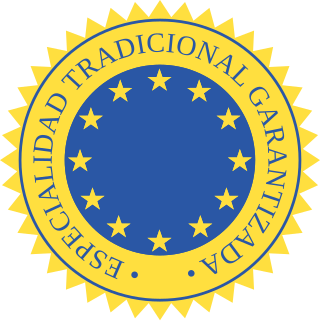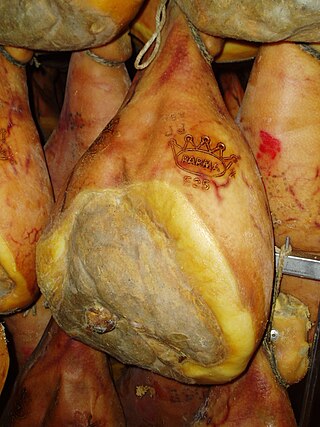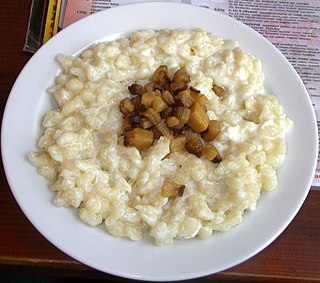A number of Irish food and drink products have been granted Protected Geographical Status under European Union law (applicable in the EU and Northern Ireland) and UK law (applicable in England, Wales and Scotland) through the Protected Designation of Origin (PDO), Protected Geographical Indication (PGI) or Traditional Speciality Guaranteed (TSG) regimes (although no TSG products from Ireland have been registered). The legislation is designed to protect regional foods and came into force in 1992.
This list is sourced from the official index published by the European Commission. [1]
Registered:

A traditional speciality guaranteed is a traditional food product protected under European Union and/or United Kingdom law. This label differs from the geographical indications protected designation of origin (PDO) and protected geographical indication (PGI) in that the TSG label does not certify that the protected food product has a link to a specific geographical area, and thus a product can be produced outside the area or country from which it originates.

Three European Union schemes of geographical indications and traditional specialties, known as protected designation of origin (PDO), protected geographical indication (PGI), and traditional speciality guaranteed (TSG), promote and protect names of agricultural products and foodstuffs, wines and spirits. Products registered under one of the three schemes may be marked with the logo for that scheme to help identify those products. The schemes are based on the legal framework provided by the EU Regulation No 1151/2012 of the European Parliament and of the Council of 21 November 2012 on quality schemes for agricultural products and foodstuffs. This regulation applies within the EU as well as in Northern Ireland. Protection of the registered products is gradually expanded internationally via bilateral agreements between the EU and non-EU countries. It ensures that only products genuinely originating in that region are allowed to be identified as such in commerce. The legislation first came into force in 1992. The purpose of the law is to protect the reputation of the regional foods, promote rural and agricultural activity, help producers obtain a premium price for their authentic products, and eliminate the unfair competition and misleading of consumers by non-genuine products, which may be of inferior quality or of different flavour. Critics argue that many of the names, sought for protection by the EU, have become commonplace in trade and should not be protected.

A blaa, or Waterford Blaa, is a doughy, white bread bun (roll) speciality, particularly associated with Waterford, Ireland. It is currently made in Waterford and South County Kilkenny.

Prosciutto crudo, in English often shortened to prosciutto, is uncooked, unsmoked, and dry-cured ham. Prosciutto crudo is usually served thinly sliced.

In France, the appellation d'origine contrôlée (AOC) is a label that identifies an agricultural product whose stages of production and processing are carried out in a defined geographical area – the terroir – and using recognized and traditional know-how. The specificity of an AOC product is determined by the combination of a physical and biological environment with established production techniques transmitted within a human community. Together, these give the product its distinctive qualities.

Jamón is a type of dry-cured ham produced in Spain. It is one of the most globally recognized food items of Spanish cuisine. It is also regularly a component of tapas.

Bergkäse refers to a number of varieties of cheese produced in the Alps. This includes products of mountain farming, the cultivation of alpine pastures as well as the milk processing of local producers in dairies. The term does not say much about the type or production method of the product called mountain cheese, which is usually a hard or semi-hard cheese with no or little holes, usually with a natural rind, but there are also semi-hard cheeses and soft cheeses under this designation. The term is used also generically for Swiss-type or Alpine cheeses, which resemble these in taste and texture but do not come from one of the traditional cheese making regions. The texture is rather hard, sometimes with small holes or cracks, the flavour strong and often a bit nutty.

The United Kingdom is a major consumer of wine, although a minor grower and producer. Wine production in the UK has historically been perceived as less than ideal due to the cold climate, but warmer summers and grapes adapted to these conditions have played a role in increasing investment and sale of wines. Most is English sparkling wine, from vineyards across Southern England and sparkling wine from Wales where the climate is warmer than that of northern areas. Vineyards are becoming more commonplace in counties such as Essex, Sussex and Kent, where more varieties of wine can be produced due to the drier and warmer climate.

The Newmarket sausage is a pork sausage made to a traditional recipe from the English town of Newmarket, Suffolk. Two varieties of Newmarket Sausage are made branded with the names of two different family butchers. Both are sold widely throughout the United Kingdom. In October 2012 the Newmarket sausage was awarded Protected Geographical Indicator of Origin (PGI) status. The flavourings used in a Newmarket sausage are black & white pepper, salt, thyme, parsley and nutmeg.
Strada dell'olio is a kind of gastronomical route in Italy that crosses a territory rich of traditional products, PDOs and PGIs, DOCs and DOCGs in Italy. It is sometimes linked to an enological tour.
Timoleague Brown Pudding is a variety of brown pudding which was granted Protected Geographical Indication status under European Union law in 1999. In 2012 the sole producer of the pudding Staunton Foods decided to stop using the PGI designation because they felt it wasn't of huge benefit to their business.

Traditional foods are foods and dishes that are passed on through generations or which have been consumed for many generations. Traditional foods and dishes are traditional in nature, and may have a historic precedent in a national dish, regional cuisine or local cuisine. Traditional foods and beverages may be produced as homemade, by restaurants and small manufacturers, and by large food processing plant facilities.

Oriel Sea Minerals is a variety of Irish sea minerals.
Sneem Black Pudding is a variety of black pudding produced in Sneem, County Kerry, Ireland.